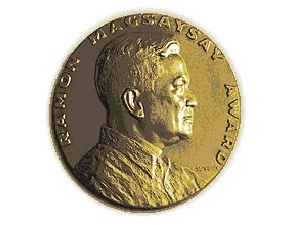Survivors lead fight against human trafficking in Nepal

Today, Laxmi Puri, 27, and Surita Danuwar, 30, laugh and smile freely, savoring their moment of great triumph as their group, the Shakti Samuha (Power Group) was named among this year’s Ramon Magsaysay Awardees for turning personal tragedy into a collective story of survivors fighting and watching out for each other.
The group organizes survivors of human trafficking who are usually shunned after their ordeal for being “soiled” women, and provides them state-funded shelters, counseling, education and livelihood training.
“Other people work for other people’s rights. But we work for our rights. That’s the difference,” said Danuwar, who is the organization’s president and one of its founders.
“The feelings and difficulties of survivors can only be understood by survivors themselves. No other person can feel how we feel,” said Puri, treasurer of this top Nepalese antitrafficking group.
Rescued from brothels
Article continues after this advertisementBoth Puri and Danuwar were among the 300 other Nepali girls rescued in a massive police raid of Indian brothels in 1996. But though the rescue freed them from their abusers, they found themselvs “kept in harsh semidetention” for months as their repatriation suffered delays, according to the Ramon Magsaysay Awards Foundation (RMAF).
Article continues after this advertisementNothing changed once they were back in their homeland, as both the government and their families disowned them, seeing them as “soiled women.” It was then that the women realized they had no one to turn to but themselves.
Fit for ‘easy jobs’ only
The survivors, aged 15 to 18 at the time, decided to form themselves into Shakti Samuha, a “power group” reaching within themselves to overcome the systemic stigma on trafficked women and start their lives anew.
Initially, their government did not appreciate the intrepid move. Recalled Danuwar: “In the beginning, when we tried to register our organization, government people would look at us from head to toe and tell us ‘oh, you are so young, and you don’t have any education and you are also looking beautiful. So you can go and work in restaurants or massage parlors or find easy jobs.’”
They were denied accreditation at first, but the women were determined to get their government’s attention. For four years, they lobbied, held survivors’ conferences, spoke in public fora and made the media rounds to talk about their plight.
“We attended our national level forum and said that our government didn’t give us permission to work in society,” Danuwar said. “The survivors also organized survivors’ conferences.” The pressure eventually compelled the government to accredit the group. In 2000, Shakti Samuha became a full-fledged, state-registered antitrafficking organization, reluctantly recognized by the government.
The women’s group now stands as the first nongovernment organization formed and run by trafficking survivors, who are working to make a dent in the multibillion dollar human trafficking industry that persists in many parts of the world, including the Philippines.
Sexual slavery
In Nepal, where the average monthly wage is $71 (P3,000), human trafficking remains a problem, with men, women and children alike trafficked domestically and overseas as forced labor and sexual slaves.
According to the 2012 Trafficking in Persons Report of the United States Department of State, the Nepalese government “does not fully comply with the minimum standards for the elimination of trafficking,” though efforts are underway. The report also cited the complicity of certain government officials with traffickers.
“It is very difficult to fight organized trafficking in Nepal. When Shakti Samuha was formed, it became easier to fight back because we have a team,” said Puri, who gave a surprised smile when told that her name in Filipino meant “dignity.”
In the last decade, Shakti Samuha has become Nepal’s leading organization, pursuing a three-pronged program of “repatriation, rehabilitation and reintegration” among trafficking victims.
State-funded shelters
The group is active in 11 Nepalese districts and has 168 members. It has some 500 trafficking victims under its care in state-funded shelters for survivors.
It has also provided counseling and job placement to at least 678 trafficking victims and livelihood training and education to 670 more. The group has reached some 15,000 Nepalese in programs aimed at spreading awareness of the human trafficking problem among the grassroots sector.
Shakti Samuha also managed to pressure the Nepalese government to strengthen its antitrafficking law. Last year, the group scored its first court victory with the conviction of a group of Nepalese traffickers, who are now serving a 117-year jail term.
“(Things have) changed,” said Danuwar. “The government now initiates support for the group and the survivors. When we need help, we ask (government) to rescue victims. Now, it’s a positive relationship.”
Reclaiming dignity
The RMAF selected Shakti Samuha as one of this year’s winners “for transforming their lives in service to other human trafficking survivors, for their passionate dedication toward rooting out a pernicious social evil in Nepal, and the radiant example they have shown the world in reclaiming the human dignity that is the birthright of all abused women and children everywhere.”
With the award, the group received a $50,000 grant to take their advocacy further. The group plans to use the money to undertake capacity-building and education programs for survivors and to mount a national-level forum for trafficking victims.
For trafficking victims, the group has one message: reach out.
“If they are survivors, they are not alone. They could open up to other survivors (and) organizations. People can support them and (help them) deal with trauma and everything [they are going through],” Danuwar said.
Related Stories:
‘I always forget that I’m a woman’